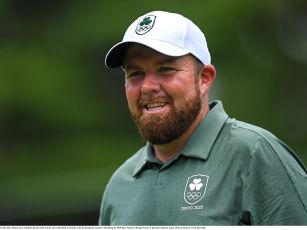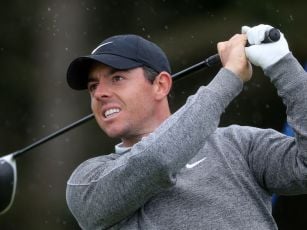Bill Walsh's high-profile departure from the Irish boxing set up was notable at Rio, but his influence on the Team USA setup was perhaps even greater.
Having been brought in with a relatively tight timeline to stamp his authority on the boxing program there, Walsh nevertheless helped them to three medals in Rio - a gold for Claressa Shileds, a silver for Shakur Stevenson, and a bronze for Nico Hernandez - their best return for 18 years.
Speaking to Nathan Murphy and Dave McIntyre on Off the Ball, Walsh revealed just how much of an impact he has had since he took over at the end of 2015, and how the results have already shown that his methods are working.
"Everybody involved with the sport there was very pleased," said Walsh of the medal haul. "It had been on a downward spiral for quite a while, but one of the reasons why I'm there is there's a lot of talent there.
"When you have huge numbers like 300 million people living in the country, there's obviously going to be a lot of talent, and boxing is big over there. It was a matter of just putting a bit of structure and a bit of discipline on them, and I think you can see in a shorty space of time, some excellent results."
Although he has spent the last month at home, and plans on attending the All-Ireland final after his employers back in the United States agreed to move his flights back because he was heading to the "Irish version of the Super Bowl," Walsh will hit the ground running once again, and already has an eye on the 2020 Games.
"We start with the next generation; we're going to start with the six male boxers we had in Rio, the oldest of them was 20, so they're a young group. If we can hold them together for four years, we could make a big impact when we get to Tokyo."

Image: United States coach Billy Walsh, right, and trainer Kay Charles talks to boxer Albert Shone Conwell, left, as Conwell fights India's Vikas Krishan during a men's middleweight 75-kg boxing match at the 2016 Summer Olympics in Rio de Janeiro. (AP Photo/Frank Franklin II)
"Prior to the Games you're firefighting, now the real change has to happen. We've really got to step in and drive home a system and a strategy that will take us to a better outcome when we get to Tokyo."
With noises emerging from the Irish camp that Michael Conlan will soon be turning pro and Paddy Barnes stateing he regrets not leaving the amateur ranks before now, the challenge for Walsh has been to avoid something similar happening to his new team of fighters.
"They're professionally orientated," said Walsh of the Team USA boxers. "In many ways it's a meal ticket for a lot of guys, a lot of clubs, a lot of coaches, and the boxers themselves. We don't really know poverty in comparison to what is supposed to be the richest nation in the world, there's a lot of poverty over there.
"These guys are looking for a way out, and boxing has been an avenue for them. It's up to me now to convince them that we have a program that's going to develop them for the next couple of years."
The major change has been securing funding for the fighters to make sure that they can stay in the program and move towards Tokyo, keeping them amateur.

Image: USA boxing coach Billy Walsh with Charles Albert Conwell. ©INPHO/Dan Sheridan
Walsh's early success has been key to that move, but despite the new setup and the prospect of a different challenge, this time around there was a
"It was my fifth Games, and it's not that you get fed up going to stuff, but it was my first time not going with my won country. Maybe that had a bit to do with it. I just felt a bit detached. The village wasn't completed to the standard it should be, the food wasn't great, the atmosphere around the village wasn't what it has been at all the other Games I've been to. It was just a bit down in that respect, but the performances of the team were heartening."
It hasn't been plain sailing for Walsh however, as he has had more than a few battles to convince the boxers and the media that his way would bring them the results they had longed for. Largely, he has come out on top thanks to the authority and autonomy granted to him, something that had proven problematic as his time with the Irish Amateur Boxing Association came to an end. Still, they took some convincing.
"One of the girls won a gold medal [in a test event last December in Rio] and they saw that the things that we were working on, that they had never done before, began to work in the ring," explains Walsh. "There were a couple of them who bought in then, but the guys came in and they became more difficult. We nearly had to get rid of a few of them, we had a couple of head to head battles."
"The guys in the American system were brought in as coaches, as volunteers - they wanted to be everybody's friend. They were looking at these guys as being professional champions down the road, and they wanted to be their friends. They were afraid, and asked them 'what would you like to do,' instead of telling them 'this is what we're going to do today, and this is how we're going to do it.'
"That was one of the conversations that I had. I told them 'OK, you have a chance here, it's up to you to take the opportunity. If you don't want it, I'll bring in the number two, and if he doesn't want it I'll bring in the number three or the number four, until I get someone that's interested in fighting for America and becoming an Olympic champion.
"They quickly learned when they knew that they weren't going to get away with any bullshit."
Speaking about why he chose to leave the Irish setup and join Team USA in the first place, Walsh was clear that the chance for progression was the deciding factor.
"I would have been crazy to reject this chance, it would have haunted me for the rest of my life if I hadn't taken it. I'm happy with my decision, I was sad that I had to leave, but I fully became committed to Team USA shortly after I got here, because I knew if I was to make this work, I had to show my commitment to the team.
"The thing I like the most about it in the Olympic training centre [in Colorado] is that every day I go in there, they ask 'what can we do for you, how can we help you?' They're not trying to put roadblocks in your way, and when they wish you good luck they actually mean it."
Walsh also has the focus of his new team on Tokyo, four years down the line, and after success in Rio he has no plans to return home.
"When I left I wasn't thinking about coming back at all," explained Walsh. "I've had a few offers to come back alright, but I didn't really think of it. When I commit to something I've committed to it.
Without saying who the offers came from, he added: "I've had a few offers in different places in Europe and in Ireland. But I started a job over there [in the United States], I'm going to see out my contract and then we're looking at Tokyo Olympic games, and I'm hopeful that we will be more successful than we were in Rio.
"At the moment I have no ambitions to come back. I'm coaching the biggest nation in the world, and when does a little guy from Wolfetone Villas in Wexford, who grew up in a two up, two down with six kids in it, get the chance to take over the biggest nation in the world? It's mind boggling to think that you could do that, and that I am doing that. I want to make that a success, and then see where I go after that."
Download the brand new OffTheBall App in the Play Store & App Store right now! We've got you covered!
Subscribe to OffTheBall's YouTube channel for more videos, like us on Facebook or follow us on Twitter for the latest sporting news and content.








